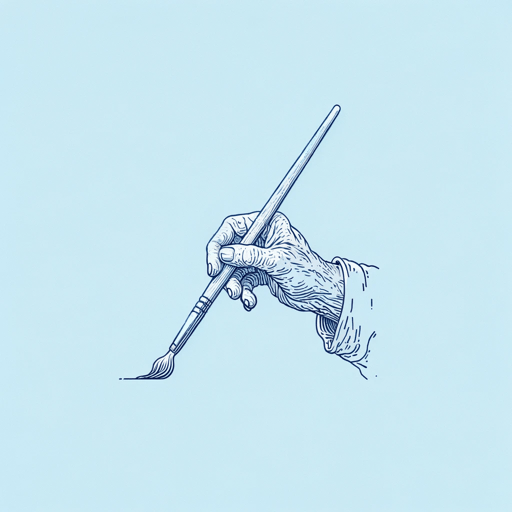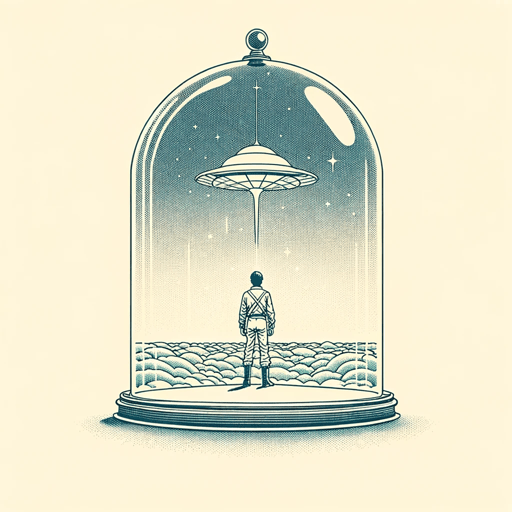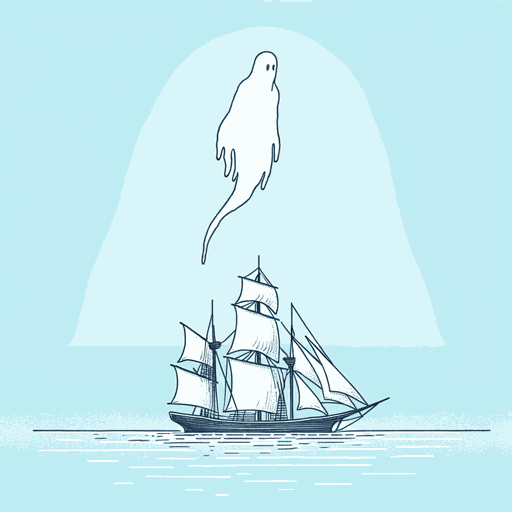50 pages • 1 hour read
Kurt Vonnegut Jr.Galapagos
Fiction | Novel | Adult | Published in 1985A modern alternative to SparkNotes and CliffsNotes, SuperSummary offers high-quality Study Guides with detailed chapter summaries and analysis of major themes, characters, and more.
Summary and Study Guide
Overview
Galapagos is a 1985 novel by American author Kurt Vonnegut. The novel’s narrator is the long-dead Leon Trout, a ghost who watched the evolution of humanity of the course of a million years. The story explores the themes Nature Versus Nurture, Pacifism, and Regret.
This guide uses an eBook version of the 1985 Dial Press edition.
Content Warning: This novel depicts explicit acts of violence and refers to death by suicide.
Plot Summary
Leon Trout, the story’s narrator, is a former US Marine who fled to Sweden after being traumatized by the Vietnam war. While in Sweden, he worked as a welder at a shipbuilders’ yard. He died while working on a ship named Bahia de Darwin. Leon’s ghost haunts the ship, and from this vantage point he observes a pivotal moment in the history of humankind. Leon describes how he stays with the ship and its passengers for a million years. During this time, humanity evolves from its modern-day form into a furry, aquatic mammal that lives mostly in the Galapagos Islands. The story of Galapagos is Leon’s narration of the events that brought humanity from its current state to the evolved form he observes in the future.
American businessmen launch a tourist venture they name the Nature Cruise of the Century. Anyone who buys tickets for this cruise will travel from the Ecuadorian city of Guayaquil to the Galapagos Islands, where they’ll enjoy an expert-led exploration of the remote islands—famously where renowned scientist Charles Darwin refined his theory of evolution. The organizers book as many rich and famous people as they can, turning the cruise into a worldwide event. Before the cruise can begin, however, the global economy crashes. Many countries quickly go bankrupt, and many people begin to starve. The tension between nations and the uprising of people leads to the outbreak of World War III.
Isolated from the economic collapse and the war, however, are the guests in the El Dorado Hotel in Guayaquil—the guests originally booked on the cruise. Mary Hepburn is a widow who’s taking the cruise because one of her late husband’s final acts was to book the tickets. She has lost her luggage and is having suicidal thoughts. James Wait is a con man who’s traveling under an assumed identity. After a difficult childhood, he established a scheme in which he marries women, takes their money, and leaves them. He plans to do the same to Mary. Andrew MacIntosh is an American businessman and a partial investor in the Bahia de Darwin. He’s trying to take advantage of the economic crisis to buy cheap real estate in Ecuador. His blind daughter, Selena MacIntosh, and her guide dog, Kazakh, stay with him in the hotel. Andrew invited Zenji and Hisako Hiroguchi, a Japanese couple, on the cruise as well. Zenji is a computer genius and the inventor of a machine named Mandarax, which can translate many languages and recall vast amounts of information. Hisako is pregnant, though she carries radiation from the Hiroshima bomb, so the baby will be born with a thick fur coat. The hotel is run by Siegfried von Kleist, the Ecuadorian son of German immigrants. His brother, Adolf von Kleist, is the captain of the Bahia de Darwin.
Due to the economic collapse, the cruise is cancelled. Zenji and Andrew have a misunderstanding that takes them to the military perimeter that separates the starving Ecuadorians from the rich hotel guests. Both are shot by a soldier, who leaves a door open, allowing a group of orphaned girls to enter the hotel. The girls are members of the Kanka-bono tribe from deep in the Ecuadorian wilderness, and they speak no English or Spanish. They find the bar, where Wait gives them snacks. Mary sees Wait feeding the helpless, starving girls and thinks he’s a good man. Siegfried tries to help the remaining guests by putting them on a bus. As war breaks out, the bus ends up at the docks. The desperate crew of the Bahia de Darwin strip the ship of food and equipment. Adolf is still present but utterly drunk.
Siegfried is killed as war breaks out in Guayaquil, but Adolf, Mary, Wait, Selena, Hisako, and the orphans escape on the ship. Wait dies of heart trouble shortly after they depart—but not before convincing Mary to marry him. After getting lost, Adolf pilots the ship to Santa Rosalia, one of the Galapagos Islands. At first, they expect to be rescued, but the survivors eventually adapt to life. Elsewhere on the planet, a disease makes people infertile, and humanity dies out. Hisako gives birth to her fur-covered daughter, Akiko. Out of intellectual curiosity, Mary begins a breeding program, in which she uses Adolf’s sperm to impregnate the Kanka-bono women. Eventually, their descendants will be the only humans left. Leon explains that these descendants will evolve into fur-covered aquatic mammals. After many years on the island, Mary and Adolf are eaten by sharks.
Leon explains that he had the choice to join his father in the afterlife or observe humanity for a million years. He chose to stay with the humans and, now that he’s content in his understanding of humanity, is ready to join his father in the afterlife.
Related Titles
By Kurt Vonnegut Jr.

2 B R 0 2 B
Kurt Vonnegut Jr.

Breakfast of Champions
Kurt Vonnegut Jr.

Cat's Cradle
Kurt Vonnegut Jr.

Deadeye Dick
Kurt Vonnegut Jr.

Epicac
Kurt Vonnegut Jr.

Fates Worse Than Death
Kurt Vonnegut Jr.

God Bless You, Mr. Rosewater
Kurt Vonnegut Jr.

Harrison Bergeron
Kurt Vonnegut Jr.

Mother Night
Kurt Vonnegut Jr.

Player Piano
Kurt Vonnegut Jr.

Slaughterhouse-Five
Kurt Vonnegut Jr.

The Sirens of Titan
Kurt Vonnegut Jr.

Welcome to the Monkey House
Kurt Vonnegut Jr.
Featured Collections
Anthropology
View Collection
Challenging Authority
View Collection
Class
View Collection
Class
View Collection
Equality
View Collection
Fate
View Collection
Guilt
View Collection
Laugh-out-Loud Books
View Collection
Nature Versus Nurture
View Collection
Order & Chaos
View Collection
Power
View Collection
Safety & Danger
View Collection
Sexual Harassment & Violence
View Collection
War
View Collection

